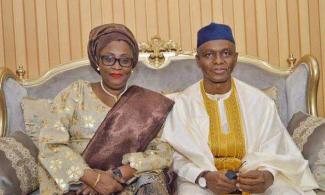
These situations pose a danger of normalizing terror as is the case currently in Nigeria. As government holds citizens responsible for their behaviour, there needs to be measures to respond to the behaviour of government towards citizens.
In the wake of killings in Southern Kaduna, Nigerians are engaging "black oppression" from a different angle. The number one family; Governor El-Rufai, his wife, and son have appeared in the eye of "social media" storms for some time now. The question of value to an African life is constantly brought to fore whenever their names make the rounds. This is coming at a time when Nigerians are maltreated in China and black Americans are protesting the countless extra-judicial killing of black men by an American policeman.
In 2017, during SMW Lagos, El-Rufai defended his claims that the Fulani herdsmen were merely avenging killings. He appealed to the logic that they never forgive and thus citizens should support the move to pay them compensation. Where do these compensations come from? Tax payer’s money. He had earlier made a tweet saying anyone who kills a Fulani herdsman takes a repayable loan
Seun Opejobi of the Daily Post quoted his explanation of this tweet in which he said: "The danger is that if the Nigerian Army goes and wipes out a Fulani settlement, any person wearing a Nigerian Army uniform in 14 West African countries is at risk because these Fulanis may have relations in Mali, Ghana, Sierra Leone, Guinea, and word would go round that the Nigerian Army has created genocide against the Fulanis and anywhere you see a person wearing a Nigerian Army uniform, is a target for retaliation and I warned the commander that this will happen. He did not listen and that is why I put it on the record so that when it starts happening, nobody would say he was not warned."https://dailypost.ng/2017/03/03/said-anyone-kills-fulani-herdsman-takes-repayable-loan-el-rufa/
The Jos killings in 2017, were tagged "reprisal" attacks against cattle rustlers instead of the terrorism that they are. Meanwhile, speaking against policies or decisions that empower certain ethnic groups or religious extremism has become almost a crime in Nigeria. It's 2020, three years after Governor El-Rufai's tweet and it's been one saga to another from Kaduna's first family.
In the month of April 2020, Bello El-Rufai, threatened to gang-rape a Twitter user's mother. His tweet, where he told a Twitter user that he would be passing his mother round, led to major outrage. A lot of questions turned to worries about the comportment, empathy and value for life that the number one family in Kaduna may or may not have. Further aggravating the situation were the comments from Mrs Hadiza El-Rufai, the governor's wife. When tagged to the tweets her son made, Mrs El Rufai said "Don’t @ me. Sow the wind, reap the whirlwind. All is fair in love and war."
All of these public or rather social media misadventures seem to be proof of either an ignorance of the struggles of the everyday Nigerian or an intentional apathy to their plights. Whether or not there's PR consulting, it's expected that leaders in a multicultural and vastly diverse country like Nigeria should be empathetic.
Still reeling from the effects of Bello El-Rufai's April tweets, Nigerians are again at the El-Rufai "family show". Some concerned citizens had asked the wife of the Kaduna State governor to comment on the Southern Kaduna killings. She made reference to not using the "First Lady" appellation as her reason for not using her twitter account for political issues. She also reminded readers that her timeline is for "language, humour and other light-hearted issues" and that she didn't swear an oath.

Her tweet reads, "Did any of you see “First Lady” in my bio? My TL is for language, humour and other light-hearted issues. I don’t tweet about serious matters like governance and politics. Though I’m married to a governor I’m not a part of government. I swore no oath."
https://twitter.com/hadizel/status/1266062786414759941?s=20
Now it is important to note that Twitter accounts not associated to government do not owe the Nigerian public a voice. However, in a situation where women, children and men; honest citizens are murdered in their sleep, these statements might come off as insensitive and downright heartless.
Central to these unsavoury representation of leadership and governance is the subject of the value of Nigerian, African or black lives.
In the United State of America, the murder of a black man, George Floyd, was captured on camera, sparking global outrage against terror on black people. The shape of terror has so metamorphosed that damage to one black African registers displeasure across the globe. However, it's important to note that insecurity and terror are perpetuated by ideas that seem to tolerate the dehumanization of the citizen. If government must cooperate with citizens to address terror, then the trust of the citizen must be earned and cherished. Unfortunately, these experiences with Kaduna being just a tiny example of what happens in Nigeria, have only created a trend that shows how flippantly this trust is held by Nigerian leaders and other leaders across the world.
The question should, moving forward, be about how citizens must exercise their voices, votes and rights to be treated as humans deserving of regards. Across Nigeria, there is a gaping hole where there should be laws and dialogue on the treatment of citizens by government officials. The public must advocate deterrents against demeaning activities, or statements addressed at citizens by those in offices of responsibility. These situations pose a danger of normalizing terror as is the case currently in Nigeria. As government holds citizens responsible for their behaviour, there needs to be measures to respond to the behaviour of government towards citizens. When that happens, then accountability in governance might be possible and then we can start to speak coherently against terror. For now, there's just something dark and ugly about how Kaduna's first family keeps showing up in the news for the wrong reasons.